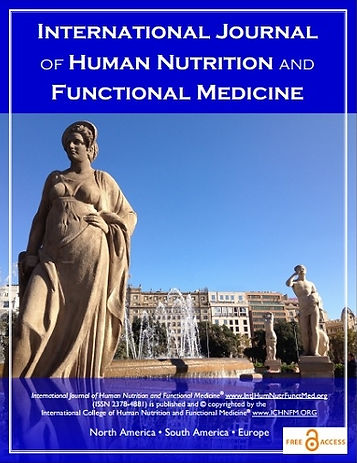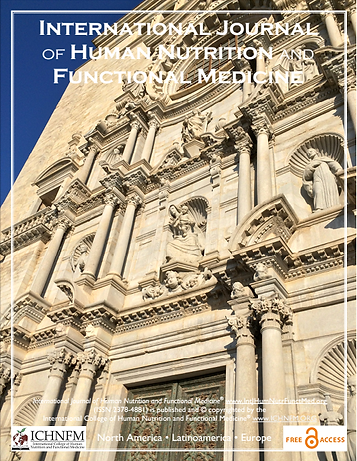Inflammation Mastery, 4th Edition = 1200 pages + 30h video: Efficient and Effective Treatment of a Wide Range of Common Diseases based on DrV's Functional Inflammology Protocol (video) and Expert-level medical-clinical integration (video).
Now available from: BookDepository.com: free delivery worldwide; Amazon.com: paper and digital ebooks; Barnes and Noble.com: best prices paper/digital; ThriftBooks; AbeBooks; BetterWorldBooks; WaterStonesBooks
Bulk discounts are still available for student groups / required textbook shipped to the same address; contact admin@ichnfm.org for details and qualifications
See DrV's new Newsletter, Videos, Courses, and Blog: https://healthythinking.substack.com/p/selfpaced-learning-antiviral-nutrition
International Journal of Human Nutrition and Functional Medicine
IJHNFM: International Journal of Human Nutrition and Functional Medicine ® (IJHNFM, ISSN 2378-4881) was originally archived at intjhumnutrfunctmed.org and is progressively being relocated to this page http://www.ichnfm.org/journal.
-
Editor: Alex Vasquez DO DC ND FACN, with more than 120 published letters, articles, books including the 1200-page Inflammation Mastery (Textbook of Clinical Nutrition and Functional Medicine, Volume 1 and Volume 2)
-
Editor's other editing experience and positions: Served in editorial and reviewer capacities for Autoimmune Diseases, PLOS One, Journal of Inflammation Research, Journal of Pain Research, Alternative Therapies in Health and Medicine, Neuropeptides, International Journal of Clinical Medicine (all PubMed/Medline indexed), Journal of Biological Physics and Chemistry, Integrated Blood Pressure Control, Journal of Naturopathic Medicine and as the founding Editor of Naturopathy Digest.
-
Editor's peer-reviewed publications: TheLancet.com, British Medical Journal (BMJ), Annals of Pharmacotherapy, Nutritional Perspectives, Journal of Manipulative and Physiological Therapeutics (JMPT), Journal of the American Medical Association (JAMA), Original Internist, Integrative Medicine, Holistic Primary Care, Alternative Therapies in Health and Medicine, Journal of the American Osteopathic Association (JAOA), Dynamic Chiropractic, Journal of Clinical Endocrinology and Metabolism, Current Asthma and Allergy Reports, Complementary Therapies in Clinical Practice, Nature Reviews Rheumatology and Arthritis & Rheumatism, the Official Journal of the American College of Rheumatology
-
Journal details and submission requirements are described below, following these 2 videos and then the journal links.

Here are links and a few details while this page is being populated:
IJHNFM 2013:
-
Description of inaugural issue: International Journal of Human Nutrition and Functional Medicine is a peer-reviewed evidence-based publication produced periodically in print and/or digital formats, available as pay-per-issue, open access (free), or as a membership benefit (included or discounted), in English and/or other languages. As the title of the journal indicates, the focus of the journal is human nutrition (i.e., we publish only human-referent information, not animal studies), and functional medicine, a broad clinical and conceptual discipline that seeks to protect, restore, and optimize human health by appreciating human physiology's systems biology construct and thus the necessity of addressing the totality of factors that influence health and disease outcomes in the psyche and soma of individual patients as well as the social corpus of local and international groups of persons.
-
Sections:
-
Clinical assessments, history taking, laboratory interpretation
-
Clinical concepts and risk management
-
Assessment and management of common musculoskeletal emergencies
-
Overview of integrative health disciplines
-
-
Availability: Printed monograph, Amazon
IJHNFM 2014:
-
Articles:
-
Availability: Magazine format, PDF
IJHNFM 2015:
-
Articles:
-
-
-
Availability: Magazine format, PDF
IJHNFM 2016:
-
Articles:
-
-
-
Availability: Magazine format, PDF
IJHNFM 2017:
-
Articles:
-
Poteet, Nutrition and macular degeneration
-
Smith, Survey Reports Improved Health After Avoiding Genetically Modified Foods. Comment and Perspective by Vasquez A.
-
-
Availability: Individual PDF
IJHNFM 2019:
-
Articles:
-
in process

International Journal of Human Nutrition and Functional Medicine ® (IJHNFM, ISSN 2378-4881) was originally archived at http://www.intjhumnutrfunctmed.org/ and is progressively being relocated to this page http://www.ichnfm.org/journal
-
Submission guidelines:
-
Details: A long list of details is provided at the front page at http://www.intjhumnutrfunctmed.org/ and these are simply the generic requirements of all journals. An overview of a few more details is provided in the points below:
-
Citations: These should be provided in the form of Authors. Title of article. Journal title; year month: volume (number), pages; see the following examples:
-
Vasquez A. Neuroinflammation in fibromyalgia and CRPS is multifactorial. Nat Rev Rheumatol. 2016 Apr;12(4):242
-
Vasquez A, Manso G, Cannell J. The clinical importance of vitamin D (cholecalciferol): a paradigm shift with implications for all healthcare providers. Altern Ther Health Med. 2004 Sep-Oct;10(5):28-36
-
Vasquez A. Musculoskeletal disorders and iron overload disease: comment on the American College of Rheumatology guidelines for the initial evaluation of the adult patient with acute musculoskeletal symptoms. Arthritis Rheum. 1996 Oct;39(10):1767-8
-
-
Topics: Anything and everything related to nutrition and functional medicine, as long as it is clinical and human-referent; we do not publish animal studies nor review articles that rely on animal data.
-
Length, graphics/labs, and pre-editing: Ideal length is 5 pages or fewer, including graphics such as diagrams or images of lab reports. Articles much longer than 5 pages need to be professionally edited prior to submission, and the reasons for this are pretty obvious, including reducing the amount of edits that we have to make in-house. We at IJHNFM have learned via experience that longer articles tend to be exhausting for high-quality editing, so we now request that articles are edited/reviewed prior to submission. Images can include diagrams, clinical photos, and laboratory reports showing relevant values, typically before and after treatment; of course, all clinical images need to be anonymous (eg, cleaned of any patient-identifying information, including faces, names, or identifying tattoos, etc).
-
Goals: Simply to publish and distribute high-quality, concise, and interesting articles that clinicians can use; topics range from exemplary case series, to editorials and perspectives, including clinical interventions, hypotheses and innovative disease models, and psychological, social, and political perspectives.
-
Exclusions: Do not send: 1) Large cumbersome articles that require too much editing and which have not been proofed prior to sending, 2) Articles in which the authors are still working out the details and their internal disagreements, 3) Poorly formatted articles that are hard to reformat or understand as they are.
-
Successful articles: Successful articles are easy to understand, pleasant to read (including images), ready for readers to use (eg, clinical cases that illuminate new treatment approaches) or consider (eg, paradigm shifts).
-
Remember: Articles take a lot of work from our staff in terms of editing, enhancing, and formatting;we invest a considerable amount of resources in refining the work, making it available to an audience of several hundred thousand readers, and occasionally providing an interpretive Editorial or contextualizing commentary.
-


